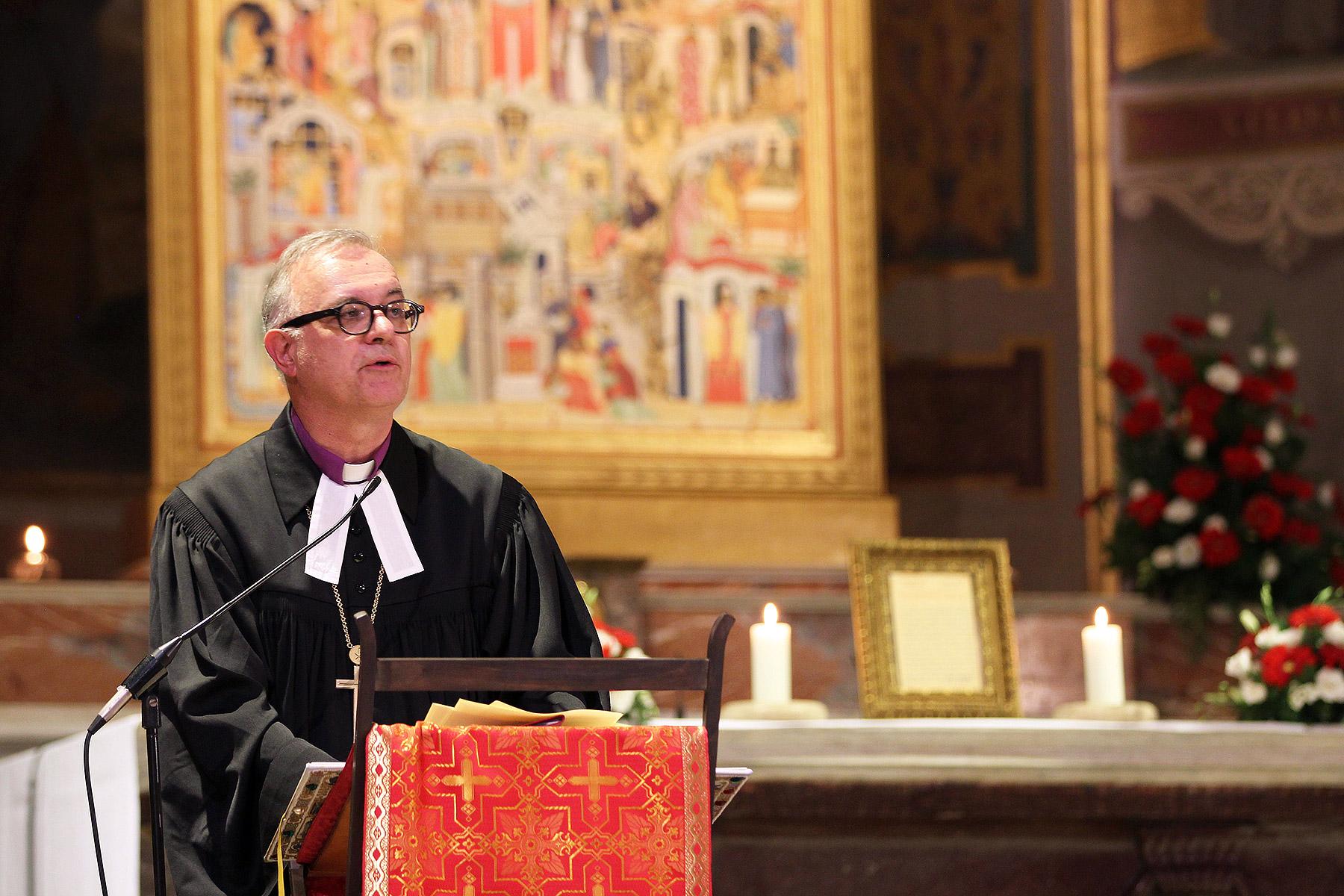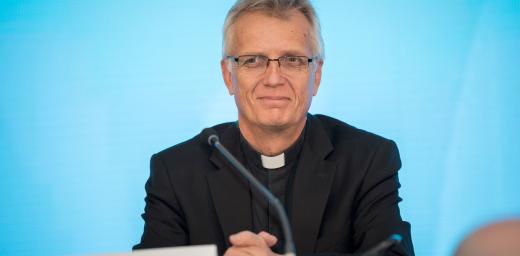Gospel without borders

Bishop Dr Frank Otfried July, chairperson of the GNC/LWF preaching in the Basilica of St Bartholomew during the commemoration service for the Polish Lutheran Bishop Juliusz Bursche. Photo: GNC/LWF/F. Hübner
Ecumenical remembrance of the martyrdom of Polish Bishop Bursche
Rome, Italy/Geneva (LWI) - In an ecumenical service at a Rome church on 9 September, Polish Lutheran Bishop Juliusz Bursche (1862-1942) was officially commemorated as a martyr of modern times. Bursche was arrested in 1939 by the Nazi secret police (Gestapo) and died in 1942 in the Sachsenhausen concentration camp.
The service in the Basilica of St Bartholomew was attended by members of Bishop Bursche’s family, Presiding Bishop Jerzy Samiec, Evangelical Church of the Augsburg Confession in Poland, and the chairperson of the German National Committee of the Lutheran World Federation (GNC/LWF), Bishop Dr Frank Otfried July. During the service, the Catholic Community of Sant'Egidio was presented with a letter from Bursche which he had written from the Sachsenhausen concentration camp. This memento symbolizes the life and work of the Protestant pastor and will remain in the church along alongside ‘relics’ of other modern martyrs from many different Christian traditions.
Witness by grace and faith
The Catholic Basilica of San Bartolomeo in Rome is a memorial church for more than 120 witnesses of the faith who lost their lives in the 20th and 21st centuries. Pope John Paul II dedicated the Basilica to the memory of these modern day martyrs in 2002 and entrusted it to the Sant’Egidio Community. He laid particular emphasis on this "ecumenism of blood," insisting that not only Catholics who had been killed for their faith should be remembered here, but also Protestants and Orthodox Christians.
In his sermon during the memorial service, July who is bishop of the Evangelical Lutheran Church in Württemberg, emphasized the importance of such witnesses of faith for Lutheran believers as well. "Christianity – also the Lutheran part of it – is a religion of remembrance. Although the Reformation had decisively criticized the veneration of saints, it never questioned the work of the persons concerned,” he said.
"By grace and faith, martyrs bear witness through their death and are thus perceived through the end of their life. Looking back, we recognize that at all times, also in the 20th and 21st centuries, there were and there are righteous people who live by faith according to God's will, who take on themselves abuse and affliction until death." San Bartolomeo is a church in which these testimonies can be experienced and kept alive," July said.
Spirit of reconciliation
Referring to the beginning of the Second World War with the German attack on Poland 80 years ago, the Württemberg bishop underlined: "Particularly we, as Christians coming from Germany, can use the memory of martyrs to become aware of our guilt and to bring it before God. [...] We must openly and sincerely confess this history of guilt and the responsibility that grows out of it. As German Lutherans, we are therefore grateful to God and to our Polish brothers and sisters for the steps of reconciliation, for the ecumenism that unites people across former borders. Common remembrance deepens ecumenism between denominations, just as much as ecumenism between East and West."
The presiding bishop of the Evangelical Church of the Augsburg Confession in Poland also underlined the ecumenical solidarity across national and confessional borders: "We can talk about the past in the spirit of reconciliation and love. We can pray together in this special basilica and share different experiences. Jesus Christ unites us all,'' Samiec said.
“An important message”
The detained Bursche had to look on helplessly as the Polish Lutheran church was liquidated. "He was imprisoned, and Nazi Germany celebrated its victory. For the bishop this was the catastrophe par excellence.” Only God could foresee the historical outcome of this: the Lutheran church in Poland was reborn after the Second World War, Samiec added.
Dr Cesare Zucconi, General Secretary of the Community of Sant'Egidio, thanked the guests for the long friendship and cooperation between Sant'Egidio and the Lutheran churches in Germany, Poland and worldwide: “We are pleased and honored to receive a precious memento of the Lutheran bishop from Poland, Juliusz Bursche, in the context of this ecumenical celebration.” Bursche was killed because he proclaimed a “gospel without borders and because he did not want to accept the nationalistic logic.” This is an important message in our times of renewed nationalisms, Zucconi said in his greeting.
Juliusz Bursche came from a German family but identified himself as Polish. As leader of the church since 1905, he was arrested by the Gestapo in October 1939 for "betrayal of the German national identity". He strove for a strong Polish Protestant church in which both Poles and Germans would find a home. On his initiative a decree of the Polish president was negotiated, which regulated the relationship between the state and the Lutheran church. This enabled the reconstruction of the church after the end of the Second World War.





